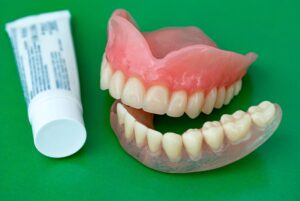
Dentures are the tried-and-true way to refill your smile after suffering from tooth loss because they can enhance the quality of your daily life. Whether you’ve lost several or most of your pearly whites, they’re a versatile solution that restores your ability to eat and speak more like you used to. That said, it’s hard to make the most of your artificial teeth if they’re slipping out of place. You might even feel anxious that they’ll fall out and embarrass you during a meal or mid-conversation.
Fortunately, several types of denture adhesive can help them stay put throughout the day so that you can set your mind at ease. If you’re overwhelmed by the many selections, keep reading to learn more about them so you can decide what works best for you!
What Are Denture Adhesives?
These adhesives, or glues, were developed to help make dentures more functional by providing a stronger hold. They typically contain three ingredients which are the adhesive itself, antimicrobial agents, and other substances that are included for flavoring, etc. The glue interacts with your saliva, it forms a sticky layer between your gums and the underside of your restoration and expands to fill in any gaps. A study in 2021 demonstrated that they can effectively improve retention, chewing ability, and bite force all at the same time.
What Are the Different Types of Denture Adhesives?
There are several kinds of glues to choose from and understanding more can help you pick the most appropriate option for your needs. The three most common are:
- Creams. These usually come in tubes and are applied in small amounts to wet dentures where they press against your gums. They create a bond that lasts all day and forms a layer of cushion to prevent any sore spots.
- Powders. This also creates an all-day hold, though it may be slightly weaker than a cream. It’s easier to apply, however, because you don’t need to worry about squeezing the right amount of product into designated areas. Instead, you sprinkle this over the entire undersurface of your artificial teeth then shake away any excess.
- Strips. These pre-cut strips are already treated with the correct amount of adhesives, making them a highly convenient choice. There’s less room for error in the application, as well as very little cleanup because there’s no excess powder or oozing cream to contend with.
Now that you have a better idea about what’s available, you can select the best adhesive for you to help your dentures remain in place!
About the Author
Dr. Charles A. Parker has more than 4 decades of experience helping patients enhance their lives by improving their dental condition. He earned his undergraduate degree at Baylor University in Waco and then achieved his DDS from the University of Texas Health Science Center in San Antonio. He continues to hone his skills with ongoing training opportunities and is a proud member of the American Dental Association and East Texas Dental Society. He can provide beautiful, lifelike restorations to increase both your oral and emotional well-being. If your dentures no longer fit well, you’re welcome to request an appointment on the website or by calling (903) 935-6351.
 Request A Free Consultation
Request A Free Consultation
